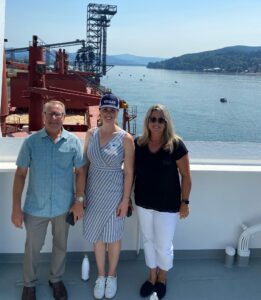Wheat industry leaders hope agricultural perspective doesn’t fall on deaf ears
The Washington Grain Commission (WGC) CEO Casey Chumrau and Washington Association of Wheat Growers (WAWG) Executive Director Michelle Hennings are participating in two advisory committees related to the Washington State Department of Transportation’s (WSDOT) analysis of the statewide transportation impacts of the potential removal of the Lower Snake River Dams (LSRD).
“The efficient management and preservation of our river systems are essential elements to the long-term economic vitality of Washington’s grain industry. By representing the interests of our grain growers, we aim to balance environmental stewardship with agricultural productivity, securing a sustainable future for all,” Chumrau said.

There has been much interest in removal of these dams for the benefit of salmon, steelhead, Pacific lamprey, bull trout, sturgeon, and other native fish species. While there have been several studies that address the topic of removing dams, there is limited understanding of how transportation would be affected. The Washington wheat industry does not support the removal of dams, which deliver critical navigation and irrigation services and contribute to the competitiveness of Washington wheat.
The Washington State Legislature has directed WSDOT to conduct an analysis of the statewide transportation impacts if the dams were to be removed, an action which lies under the purview of the U.S. Congress. The WSDOT Lower Snake River Dams Transportation Study includes analysis of highway, road, and freight rail transportation needs options; and impacts of shifting the movements of freight and goods, that currently move by barge, to truck and rail. This study will fulfill the request by the State Legislature.
In addition to the approval and funding of the transportation study, the Legislature directed the Joint Transportation Committee (JTC) to hire an Independent Review Team to concurrently review the WSDOT LSRD transportation analysis.
“Our Marine Highway 84 provides a clean, efficient, and reliable transportation alternative for our wheat growers. It is crucial that we actively participate in the discussions of these two committees to provide feedback as the studies progress,” Hennings said. “I appreciate the fact-finding missions of these two committees and their willingness to listen to the various perspectives on transportation issues and the stakeholders’ concerns. Maintaining wheat growers’ current competitive transportation options and advantages is critical and must be considered in any future strategies.”
Committee appointments
The first advisory committee is organized by WSDOT to advise on key elements of its transportation analysis, including existing conditions and potential impacts of proposed mitigations. The advisory committee will also provide the most up-to-date local, regional, and state data. The WSDOT advisory committee will hold approximately 12 meetings, held every other month between summer 2024 and spring 2026. Hennings will participate in this committee.
The second committee, the River Transportation Work Group, is part of the JTC independent review effort. Committee members and the WSU Freight Policy Transportation Institute will evaluate the transportation analysis and modeling being conducted by the WSDOT team of consultants for accuracy. The River Transportation Work Group is comprised of representatives of grain production/processing, forest products, fertilizer, barge and rail operators, cruise lines, ports, federally recognized tribes, and other regional stakeholders. Chumrau will participate in in the second committee.
Quarterly summary findings from the JTC Independent Review Team will be provided to WSDOT, the Governor’s office, the House and Senate Transportation Committees. Their final report to these groups is due by June 30, 2025.
The final report is scheduled to be released in December 2026.
Collaborative efforts for stakeholder engagement

The LSRD are more than just concrete and steel; they are the critical infrastructure that creates the vital arteries for the transportation of the food Washington’s farmers grow to family tables across the state and around the world. In short, the dams facilitate a navigation system that is essential for the efficient and cost-effective movement of grain to international markets. Further, according to dam passage survival test results, the LSRD also boast an average yearling Chinook salmon survival rate of 97%.
The WGC and WAWG have been vocal about their stance, emphasizing that the removal of the dams would significantly hinder the competitiveness of Washington wheat and, by extension, the state’s economy.
These advisory committees could be a platform for Chumrau and Hennings to voice the concerns and perspectives of the wheat industry. Their two organizations have long been at the forefront of advocating for the interests of wheat and barley growers in the state. Their participation in the advisory committees is a testament to their proactive approach in shaping policies and decisions that impact the agricultural sector, and their involvement ensures that the growers’ voices are heard and considered in the complex decision-making processes that affect their livelihoods. Chumrau and Hennings remain hopeful that the perspectives shared by all stakeholders will be given equitable consideration.
This project is also being watched at the federal level. In 2001, the National Wildlife Federation and other environmental groups filed a lawsuit against the federal government for violating the Endangered Species Act. The four Columbia River Treaty Tribes joined the lawsuit that same year.
On December 14, 2023, a Joint Motion to Stay Litigation (initially filed in 2001) was filed in federal court. The stay calls out the “Columbia Basin Restoration Initiative,” an unprecedented federal agreement to fund salmon recovery and invest in and support communities and economic sectors in and around the Columbia River Basin (e.g., energy, transportation, agriculture, and recreation). The WSDOT transportation analysis is briefly cited as one of the components that will support this Initiative.
Participation by Chumrau and Hennings underscores their commitment to safeguarding the agricultural community’s future in Washington, and their collaborative efforts to maintain the competitiveness of Washington wheat and the economic vitality of the state.
